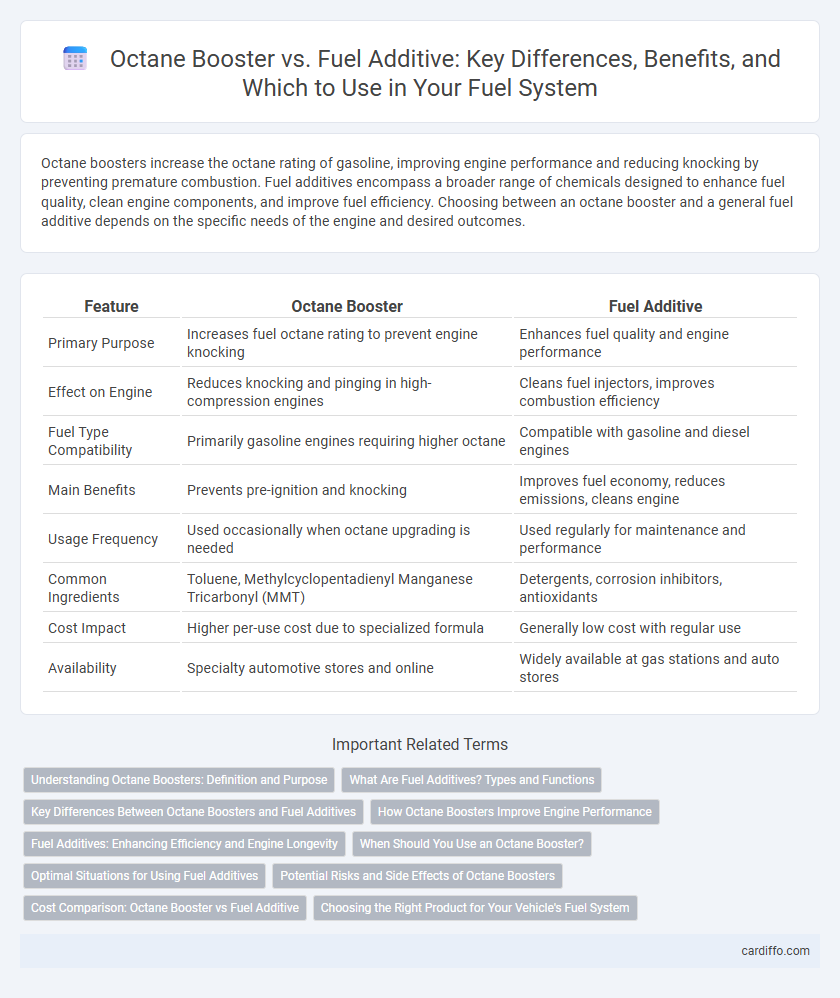Octane boosters increase the octane rating of gasoline, improving engine performance and reducing knocking by preventing premature combustion. Fuel additives encompass a broader range of chemicals designed to enhance fuel quality, clean engine components, and improve fuel efficiency. Choosing between an octane booster and a general fuel additive depends on the specific needs of the engine and desired outcomes.
Table of Comparison
| Feature | Octane Booster | Fuel Additive |
|---|---|---|
| Primary Purpose | Increases fuel octane rating to prevent engine knocking | Enhances fuel quality and engine performance |
| Effect on Engine | Reduces knocking and pinging in high-compression engines | Cleans fuel injectors, improves combustion efficiency |
| Fuel Type Compatibility | Primarily gasoline engines requiring higher octane | Compatible with gasoline and diesel engines |
| Main Benefits | Prevents pre-ignition and knocking | Improves fuel economy, reduces emissions, cleans engine |
| Usage Frequency | Used occasionally when octane upgrading is needed | Used regularly for maintenance and performance |
| Common Ingredients | Toluene, Methylcyclopentadienyl Manganese Tricarbonyl (MMT) | Detergents, corrosion inhibitors, antioxidants |
| Cost Impact | Higher per-use cost due to specialized formula | Generally low cost with regular use |
| Availability | Specialty automotive stores and online | Widely available at gas stations and auto stores |
Understanding Octane Boosters: Definition and Purpose
Octane boosters are specialized fuel additives designed to increase the octane rating of gasoline, enhancing engine performance and preventing knocking or detonation. These boosters work by raising the fuel's resistance to premature ignition, ensuring smoother combustion in high-performance or older engines. Unlike general fuel additives, octane boosters specifically target octane enhancement rather than improving fuel system cleanliness or efficiency.
What Are Fuel Additives? Types and Functions
Fuel additives are chemical compounds added to gasoline or diesel to improve engine performance, enhance fuel efficiency, and reduce emissions. Common types include octane boosters that increase fuel's resistance to knocking, detergents that clean fuel injectors, corrosion inhibitors that protect engine components, and stabilizers that extend fuel shelf life. Each additive serves a specific function, such as improving combustion quality, preventing deposit buildup, or protecting the fuel system from wear and contamination.
Key Differences Between Octane Boosters and Fuel Additives
Octane boosters primarily increase a fuel's octane rating, preventing engine knocking and improving performance under high compression, while fuel additives encompass a broader range of chemical compounds designed to clean, lubricate, or stabilize fuel systems. Octane boosters typically contain compounds like MTBE or ethanol to elevate combustion quality, whereas fuel additives may include detergents, corrosion inhibitors, or stabilizers to enhance fuel longevity and engine efficiency. Understanding the distinct roles of octane boosters versus general fuel additives is crucial for optimizing engine health and fuel economy.
How Octane Boosters Improve Engine Performance
Octane boosters increase the fuel's octane rating, preventing engine knocking and allowing for more efficient combustion, which enhances power output and fuel efficiency. By raising the ignition threshold, these additives enable high-compression engines to run smoothly and deliver optimal performance. Fuel additives improve overall fuel quality, but octane boosters specifically target combustion stability and engine responsiveness for superior performance gains.
Fuel Additives: Enhancing Efficiency and Engine Longevity
Fuel additives improve engine performance by enhancing combustion efficiency and reducing deposit buildup, leading to smoother operation and increased fuel economy. Unlike octane boosters that primarily raise octane ratings to prevent knocking, fuel additives contain detergents, antioxidants, and corrosion inhibitors that protect engine components and extend engine life. Regular use of fuel additives can decrease emissions and maintain fuel system cleanliness, resulting in sustained engine durability and efficiency.
When Should You Use an Octane Booster?
Use an octane booster when your engine experiences knocking, pinging, or hesitation due to low fuel octane, especially in high-performance or turbocharged engines requiring higher octane ratings for optimal combustion. Octane boosters enhance fuel's resistance to premature detonation, improving engine efficiency and preventing damage. For regular maintenance or to clean fuel system components, standard fuel additives are preferable, as they focus more on deposits removal and fuel stability rather than raising octane levels.
Optimal Situations for Using Fuel Additives
Fuel additives enhance engine performance by cleaning fuel systems and improving combustion efficiency, making them optimal for everyday maintenance and preventing carbon buildup. Octane boosters specifically raise the fuel's octane rating, ideal for high-performance engines or vehicles experiencing knocking under heavy load. Using fuel additives in regular gasoline engines helps maintain fuel injector cleanliness, while octane boosters are best suited for preventing pre-ignition in demanding driving conditions.
Potential Risks and Side Effects of Octane Boosters
Octane boosters can increase engine performance by raising the fuel's resistance to knocking, but they carry potential risks such as damaging fuel system components and increasing emissions. Overuse or improper application may lead to carbon buildup, clogged injectors, and reduced fuel efficiency. Users should carefully follow manufacturer guidelines to avoid adverse effects on engine health and emissions compliance.
Cost Comparison: Octane Booster vs Fuel Additive
Octane boosters typically have a higher upfront cost per fluid ounce compared to standard fuel additives due to their specialized formulation that enhances fuel octane levels. Fuel additives generally offer a more affordable option for overall engine maintenance, including detergents and stabilizers, but may lack the specific performance benefits of octane boosters. When evaluating cost-effectiveness, octane boosters provide targeted performance improvements at a premium price, whereas fuel additives deliver broader fuel system benefits at a lower cost.
Choosing the Right Product for Your Vehicle's Fuel System
Octane boosters increase the fuel's octane rating, preventing engine knocking and enhancing performance in high-compression engines, while fuel additives target specific issues like cleaning injectors, reducing emissions, or improving fuel stability. Selecting the right product depends on your vehicle's fuel system requirements and manufacturer recommendations, ensuring compatibility and effectiveness. For optimal results, consult your owner's manual and choose additives or boosters designed to address your vehicle's unique performance and maintenance needs.
Octane Booster vs Fuel Additive Infographic

 cardiffo.com
cardiffo.com